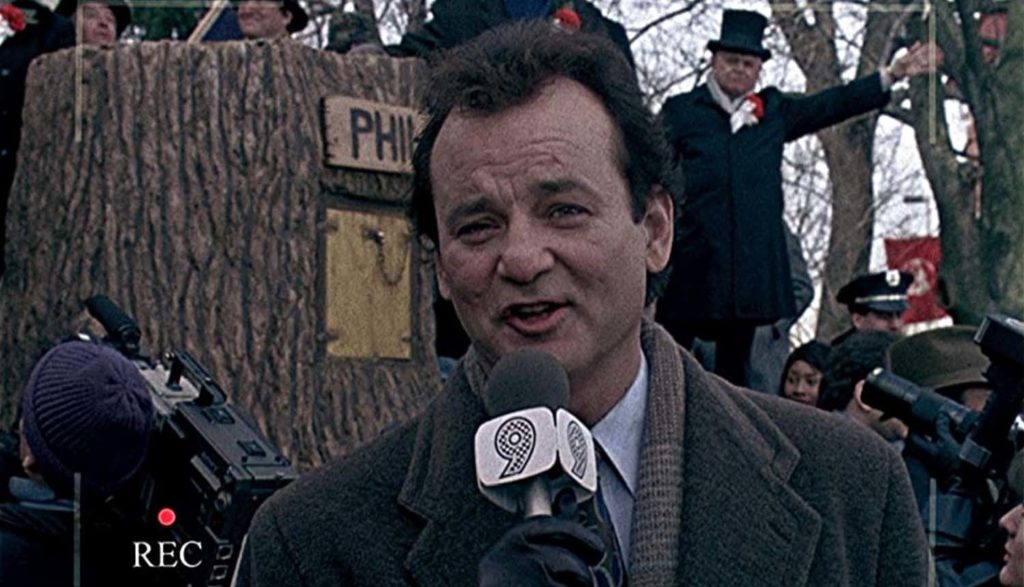When the Bill Murray comedy Groundhog Day was released nearly 30 years ago, it wasn’t considered a classic. The critics liked it but didn’t love it. Moviegoers made it a moderate success. It did just fine.
But just like Phil Connors’ endless Feb. 2, the movie never really went away. In fact, it’s just gotten bigger—so big, in fact, that when most people hear the phrase “Groundhog Day,” they’re more liable to think of Sonny and Cher’s “I Got You Babe” than six more weeks of winter.
The movie became a classic, I think, because of its philosophical and even spiritual underpinnings. Roughly based on a journey through the five stages of grief, Groundhog Day drills deeply into one of life’s biggest issues: meaning. Between its stepped-in puddles and piano lessons, both Phil (played by Murray) and the viewer are forced to wonder, Why are we here? What are we supposed to be doing with our time? And while the movie definitely has some rough spots here and there (Phil initially is all about bedding his attractive coworker), the takeaway is a doozy.
But as I was thinking through the film a bit, something else—something fairly obvious—struck me. In Groundhog Day, time seems literally endless. But for us, on this Earth, time is a finite thing—and often, the time given to us feels oh so short.
Because of Groundhog Day’s time loop, Phil Connors has the opportunity to live the day again and again—correcting mistakes, perfecting approaches, honing himself into, well, a decent human being. We’re not so lucky. Our mistakes, once made, sully our stories. Our sins stain our timelines. We don’t have a chance to erase our errors in this life—sweep them clean so neither we nor anyone around us remembers them.
That’s why we need grace so badly.
Groundhog Day is, on some level, a very Buddhist sort of story. Phil’s endlessly repeating day has echoes of the continuous recycling of death and rebirth that Buddhists believe that we’re all apart of. And like Phil, the object of life is to learn a little more each time out—to eventually break the cycle and move on.
But Christians believe that this life is all we really get in our mortal form. Yes, we learn a little more about ourselves, and our world, and our God, each day. Each year. But there’s never really a point where we’ll truly “get it,” where we’ll perfect ourselves and stop making mistakes. We’re fallen creatures, and we illustrate how fallen we are—to ourselves and to others—way more often than we’d like.
We can’t literally erase our sins. All the apologies we offer or all the restitutions we make don’t wipe away the memories of what we’ve done. Sure, hurts heal. We forgive. But forgetting? It’s beyond us.
But the Bible tells us that God—even though He literally knows everything—chooses to remember our sins no morewhen we accept His love into our lives and ask for forgiveness. Our sins are erased from our ledger. Wiped clean from the board. Not held against us. “I am he who blots out your transgressions for my own sake, and I will not remember your sins,” God says in Isaiah 43:25.
It’s as if they were just Groundhog Day’ed out of existence.
That said, I’d suggest that it’s important for us to remember our mistakes on some level. Like Phil, it helps us to correct them. To not just move on, but to move in a better direction. Those mistakes are our best teachers, really. While we’ll never stop making them, we can learn from them.
Phil’s efforts to play the piano in Groundhog Day are a small-but-important illustration of both that element in the movie and in our own lives. Each new “day,” he receives a lesson from an increasingly mystified piano teacher—a halting, mistake-prone beginner at first who slowly plays himself into a place of competence and, ultimately, artistry.
We have to do the same thing in our lives: take the time God gives us and move forward, day by day, decision by decision, even mistake by mistake. We don’t get do-overs. But we do learn. We do grow. And perhaps ultimately—thanks to God’s infinite patience and glorious grace—we make music.







Recent Comments